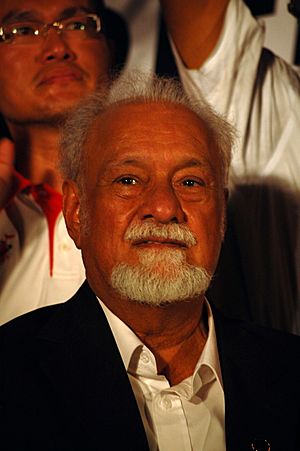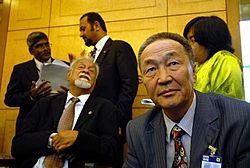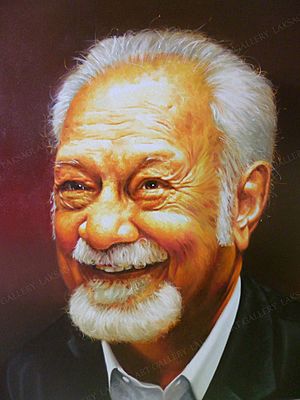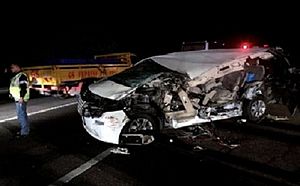Karpal Singh facts for kids
Quick facts for kids
Yang Berbahagia Dato' Seri Utama
Karpal Singh
DUPN
|
|
|---|---|
|
ਕਰਪਾਲ ਸਿੰਘ
|
|

Karpal in Kuching in 2011.
|
|
| 3rd National Chairman of the Democratic Action Party | |
| In office 4 September 2004 – 29 March 2014 |
|
| Secretary-General | Lim Guan Eng |
| Preceded by | Lim Kit Siang |
| Succeeded by | Tan Kok Wai |
| Member of the Malaysian Parliament for Bukit Gelugor |
|
| In office 21 March 2004 – 17 April 2014 |
|
| Preceded by | Position established |
| Succeeded by | Ramkarpal Singh |
| Member of the Malaysian Parliament for Jelutong |
|
| In office 31 July 1978 – 29 November 1999 |
|
| Preceded by | Rasiah Rajasingam |
| Succeeded by | Lee Kah Choon |
| Personal details | |
| Born |
Karpal Singh s/o Ram Singh Deo
28 June 1940 George Town, Penang, Straits Settlements (now Malaysia) |
| Died | 17 April 2014 (aged 73) Gua Tempurung, Perak, Malaysia |
| Political party | Democratic Action Party (1970–2014) |
| Spouse | Gurmit Kaur (1970–2014, his death) |
| Children | Jagdeep Singh Deo Gobind Singh Deo Ramkarpal Singh Sangeet Kaur Deo Mankarpal Singh |
| Parents | Ram Singh Deo (father) Kartar Kaur (mother) |
| Residences | Damansara Heights, Kuala Lumpur |
| Alma mater | National University of Singapore |
| Occupation | Politician |
| Profession | Lawyer |
| Other name | Tiger of Jelutong |
| Ethnicity | Punjabi |
| Education | St. Xavier's Institution, George Town, Penang |
Dato' Seri Utama Karpal Singh s/o Ram Singh Deo (Punjabi: ਕਰਪਾਲ ਸਿੰਘ, romanized: Karpāl Siṅgh; 28 June 1940 – 17 April 2014) was an Indian Malaysian politician and lawyer. He was Member of Parliament (MP) for the constituency of Bukit Gelugor in the state of Penang from 2004 to 2014. During that time, he was also the National Chairman of the Democratic Action Party (DAP).
Born in Penang to Sikh Punjabi Indian immigrant parents, Karpal studied law at the National University of Singapore. He was one of Malaysia's most prominent lawyers and took a number of high-profile cases. Karpal was an opponent of the death penalty.
In the courtroom and Parliament, he was a controversial figure. Karpal was suspended from Parliament several times, charged with sedition and detained under Malaysia's internal-security law. His reputation as a lawyer and opposition politician gave him the nickname "the Tiger of Jelutong".
Karpal's political career began in 1970 (when he joined the DAP), and he won a seat in the Kedah State Legislative Assembly in 1974. He was elected to Parliament in 1978 as representative for Jelutong, Penang, and held the seat for more than 20 years until he lost it in 1999. Karpal returned to Parliament in the next general election, and led the DAP to its strongest-ever performance in the 2008 general election. A 2005 motor-vehicle accident put Karpal in a wheelchair, with neuro-motor problems in his right arm, but he continued his legal and political careers. He died on 17 April 2014 after another motor-vehicle accident.
Contents
Early life and education
Born in Georgetown, Penang, Karpal was the son of watchman and herdsman Ram Singh Deo. His mother was Kartar Kaur.
Karpal studied at St. Xavier's Institution and received his Bachelor of Laws from the National University of Singapore, where he was president of the student union. He was barred from his hostel for protesting the university's decision to mandate certificates of political suitability for incoming students. Karpal said he took seven years to graduate, admitting that he was "playful" and "didn't attend lectures". After failing his final-year courses, the dean made him sit at the front of his classes; according to Karpal, "I couldn't play the fool anymore and I passed my exams accordingly!"
Legal career
He was called to the Penang bar in 1969 and joined a firm in Alor Star, Kedah. Karpal founded his legal firm the following year, and was known for his expertise in the field of litigation. He was a pioneer in habeas corpus cases, and opposed the death penalty. Karpal was praised for "defending the little man", and was called "a friend to the oppressed and marginalised." Universiti Teknologi MARA law professor Shad Saleem Faruqi praised Karpal's legal team for their innovative interpretations, which helped defendants with difficult cases.
Death penalty
Karpal was described as a leading opponent of the death penalty in Malaysia.
In 1977, Karpal managed to persuade the Yang di-Pertuan Agong to pardon a 14-year-old Chinese boy who was sentenced to death for possession of a firearm under the Internal Security Act, reportedly suggesting that to let the boy hang would be "politically explosive."
Political career
Entry into politics
Karpal joined the Democratic Action Party (DAP) in 1970, citing its multiracial platform after the 1969 race riots. Although he planned to contest the 1974 general election in Penang, he withdrew after his father's death. However, Karpal was persuaded by DAP national organising secretary Fan Yew Teng to stand for the Alor Setar parliamentary seat and the Alor Setar Bandar state seat. He won only the state seat, the first DAP candidate to win a seat in Kedah.
In the 1978 general elections, Karpal won the Jelutong parliamentary seat and the Bukit Gelugor state seat. He held the Bukit Gelugor state seat until 1990, losing subsequent elections for the Sungai Pinang and Padang Kota seats.
Setback
In the 1999 election, Karpal lost the Jelutong parliamentary seat he had held for 21 years, and DAP leader Lim Kit Siang was also defeated. The DAP had joined Barisan Alternatif, an opposition alliance with Parti Keadilan and the Pan-Malaysian Islamic Party (PAS) (a move strongly supported by Karpal and Lim). Despite the ruling Barisan Nasional (BN) coalition's significant losses in the election, Keadilan and PAS absorbed the gains as DAP support eroded due to suspicion of PAS and its hard-line Islamic stance. Although the DAP gained seats, the party performed well below expectations and Lim called the results a "catastrophic defeat". Despite the setback, Karpal remained as party deputy chairman and Lim became chairman after the resignation of long-serving chairman Chen Man Hin. Karpal strongly opposed a PAS plan to introduce hudud (Islamic codes of behavior) into the Terengganu state legal system in 1999, threatening to take the state government to court.
Return to Parliament
In the 2004 general election, Karpal returned to Parliament with a 1,261-vote majority in the new Bukit Gelugor seat. The DAP regained its position as the largest opposition party in Parliament, and Karpal became the party's national chairman on 4 September 2004.
On 7 September, he was sanctioned for "misleading Parliament" after claiming that MPs had to raise their right hand while they took the oath of office on 17 May. A report by the Parliamentary Rights and Privileges Committee gave Karpal three days to apologise or face a six-month suspension. He refused to apologise, and served the suspension.
Victories and controversy
Karpal retained his seat in the 2008 election with a nearly-20-fold-vote increased majority (21,015 votes). The election saw historic gains for the opposition, who denied the ruling coalition Barisan Nasional (BN) a two-thirds majority in Parliament for the first time.
The three major opposition parties formed a coalition (the Pakatan Rakyat), and Karpal was listed as the DAP representative on the coalition's Shadow Ministry of Home Affairs Committee in July 2009.
In April 2010, he was suspended from Parliament for ten days after he called the speaker a "dictator". In December of that year, he and opposition MPs Anwar Ibrahim, Azmin Ali and Sivarasa Rasiah were suspended for six months. Anwar was suspended for stirring up controversy over government links to APCO Worldwide, while the rest were punished for publicising a report by the Rights and Privileges Committee finding Anwar guilty before the report was presented to Parliament.
In December 2011, Karpal and Penang second deputy chief minister P. Ramasamy feuded over Ramasamy's reported accusation that dissidents in the DAP were plotting against him for not giving them projects and favours. Karpal called Ramasamy a "warlord" and asked for him to resign as deputy chief minister. Ramasamy asked the party to remove its "godfathers", an apparent reference to Karpal. The feud was resolved internally, and Ramasamy later denied ever making the accusation. At the DAP national conference in January 2012, Karpal joined Ramasamy and asked the party's "warlords and godfathers [to] stand together against Barisan Nasional."
Political views
Karpal Singh cited David Saul Marshall, Mahatma Gandhi and John F. Kennedy as influences. The 13 May Incident convinced him that Malaysia needed to take a multiracial course, and he joined the DAP in 1970. Karpal praised the country's first prime minister, Tunku Abdul Rahman for promoting racial unity. He criticised the legal immunity granted to the hereditary Malay rulers in the original constitution, which was removed by the government in 1993.
Karpal Singh opposed the idea of Malaysia as an Islamic state, arguing that the constitution provided for a secular nation with Islam as the official religion, and clashed with Mahathir and the fellow opposition party PAS over the issue. Karpal said "an Islamic state over my dead body" about the debate during a political speech, but later said that he apologised for the remark.
Reputation
Karpal was a controversial figure, and he and fellow DAP politician Lim Kit Siang were called racial provocateurs. He was nicknamed "the Tiger of Jelutong" by admirers after serving five terms as Jelutong MP. Karpal attributed the nickname to a confrontation with former Malaysian Indian Congress President Samy Vellu when he said to Samy, "he could be the lion, and I could be the tiger, because there are no lions in Malaysia!"
Detentions
He and a number of other opposition politicians were detained without trial under the Internal Security Act during Operation Lalang in October 1987 for inciting "racial tension" in Malaysia. Karpal was released for several hours in March 1988 in response to a habeas corpus application before being rearrested and imprisoned until January 1989. Amnesty International called him a prisoner of conscience.
Sedition trials
Karpal, four other opposition politicians and the editor of the Harakah Daily (the newspaper published by the opposition Pan-Malaysian Islamic Party) were arrested in January 2000 under the Sedition Act, and he was charged with making seditious remarks in court during Anwar's first corruption trial. This, the only known charge of sedition in any Commonwealth country brought against a lawyer for remarks made in court in defence of a client, was dropped in 2002.
He was again charged under the Sedition Act in March 2009 with threatening to sue the Sultan of Perak, Sultan Azlan Shah, in the wake of the 2009 Perak constitutional crisis. Karpal had contended that the sultan had exceeded his constitutional powers in appointing Zambry Abdul Kadir Menteri Besar. The charges were dismissed in June 2010 after the High Court determined that the prosecution had failed to prove a prima facie case. However, the Court of Appeal reversed the acquittal in January 2012 and ordered Karpal to enter a defence. In March 2019, 10 years after the incident the Federal Court acquitted Karpal posthumously.
Personal life
Family
Karpal married Gurmit Kaur, eight years his junior, in July 1970. Gurmit's family, from Narathiwat, Thailand, moved to Penang when she was seven. They had five children and eleven grandchildren. Karpal's eldest son, Jagdeep, is the Penang State Assemblyman for Datok Keramat; his second son, Gobind, was the Minister of Communications and Multimedia and is the Member of Parliament for Puchong, Selangor. His third son, Ramkarpal succeeded him as the MP for Bukit Gelugor after his death. His daughter, Sangeet Kaur works in his law firm and his youngest son, Man Karpal studied actuarial science.
Gurmit described Karpal's detention from 1987 to 1989 as a "very big experience", which took a toll on her life because she had to "be strong" for their young children. The initial stage of his disability also deeply upset her. Karpal and Gurmit lived in Damansara Heights, Kuala Lumpur, from 1994 until his death.
Accident and disability
On 28 January 2005, Karpal was involved in an accident which left him in a wheelchair. A car struck a taxi in which he was seated from behind, severely bruising his thoracic vertebrae. The accident left Karpal with sensory impairment and reduced motor strength, and he was unable to walk or raise his right arm more than a few centimeters. His seat in the parliamentary chamber was moved to the back row to accommodate his wheelchair.
Death
In the early hours of 17 April 2014, Karpal died in a car crash on the North–South Expressway E1 near Gua Tempurung, Perak.
Karpal's funeral was held on 20 April 2014 with full state honors in Penang, attended by his Family, Prime Minister Najib Razak and other mourners. His body reached the Batu Gantong Crematorium, George Town, Penang at 1:35 pm and was cremated after thousands of mourners chanted his name. His son, Gobind, memorialised him on 5 May during the last of a series of tributes.
Memorials, awards and accolades
On 19 April 2014, two days after his death, the IJM Promenade in Lebuh Sungai Pinang was renamed Karpal Singh Drive (Persiaran Karpal Singh). The Full Biography: Karpal Singh, Tiger of Jelutong by Tim Donoghue, published in 2014 by Marshal Cavendish International, is an updated edition of Donoghue's Karpal Singh: Tiger of Jelutong which published prior to his death. Karpal received the Glory of India Award of Excellence in 2011, and was one of the top 10 NRI Newsmakers of 2008.
Honours
 Penang :
Penang :
Election results
| Year | Constituency | Votes | Pct | Opponent(s) | Votes | Pct | Ballots cast | Majority | Turnout | |||
|---|---|---|---|---|---|---|---|---|---|---|---|---|
| 1974 | Alor Setar | Karpal Singh Ram Singh (DAP) | 9,450 | 41.32% | Oo Gin Sun (MCA) | 13,420 | 58.68% | 23,939 | 3,970 | 61.24% | ||
| 1978 | Jelutong | Karpal Singh Ram Singh (DAP) | 23,606 | 51.33% | Lee Him (Gerakan) | 19,985 | 43.45% | 47,308 | 3,621 | |||
| Yeap Ghim Guan (SDP) | 2,401 | 5.22% | ||||||||||
| 1982 | Karpal Singh Ram Singh (DAP) | 29,099 | 55.21% | Ooi Ean Kwong (Gerakan) | 23,603 | 44.79% | 53,870 | 5,496 | 75.77% | |||
| 1986 | Karpal Singh Ram Singh (DAP) | 25,932 | 62.09% | Lim Boo Chang (Gerakan) | 15,833 | 37.91% | 42,723 | 10,099 | 71.34% | |||
| 1990 | Karpal Singh Ram Singh (DAP) | 27,426 | 60.05% | Ooi Ean Kwong (Gerakan) | 18,248 | 39.95% | 46,515 | 9,178 | 74.87% | |||
| 1995 | Karpal Singh Ram Singh (DAP) | 21,896 | 49.84% | Rhina Bhar @ Rani Raj Pal (Gerakan) | 21,613 | 49.19% | 44,922 | 283 | 75.05% | |||
| Lim Cheak Kow (PBS) | 425 | 0.97% | ||||||||||
| 1999 | Karpal Singh Ram Singh (DAP) | 20,716 | 49.08% | Lee Kah Choon (Gerakan) | 21,491 | 50.92% | 43,239 | 775 | 72.82% | |||
| 2004 | Bukit Gelugor | Karpal Singh Ram Singh (DAP) | 22,529 | 51.44% | Lim Boo Chang (MCA) | 21,268 | 48.56% | 44,618 | 1,261 | 74.21% | ||
| 2008 | Karpal Singh Ram Singh (DAP) | 35,140 | 71.33% | Koay Kar Huah (MCA) | 14,125 | 28.67% | 50,553 | 21,015 | 77.05% | |||
| 2013 | Karpal Singh Ram Singh (DAP) | 56,303 | 80.55% | Teh Beng Yeam (MCA) | 13,597 | 19.45% | 70,683 | 42,706 | 86.31% | |||
| Year | Constituency | Votes | Pct | Opponent(s) | Votes | Pct | Ballots cast | Majority | Turnout | |||
|---|---|---|---|---|---|---|---|---|---|---|---|---|
| 1991 | Prai | Karpal Singh Ram Singh (DAP) | V Muthusamy (MIC) | |||||||||
See also
 In Spanish: Karpal Singh para niños
In Spanish: Karpal Singh para niños




